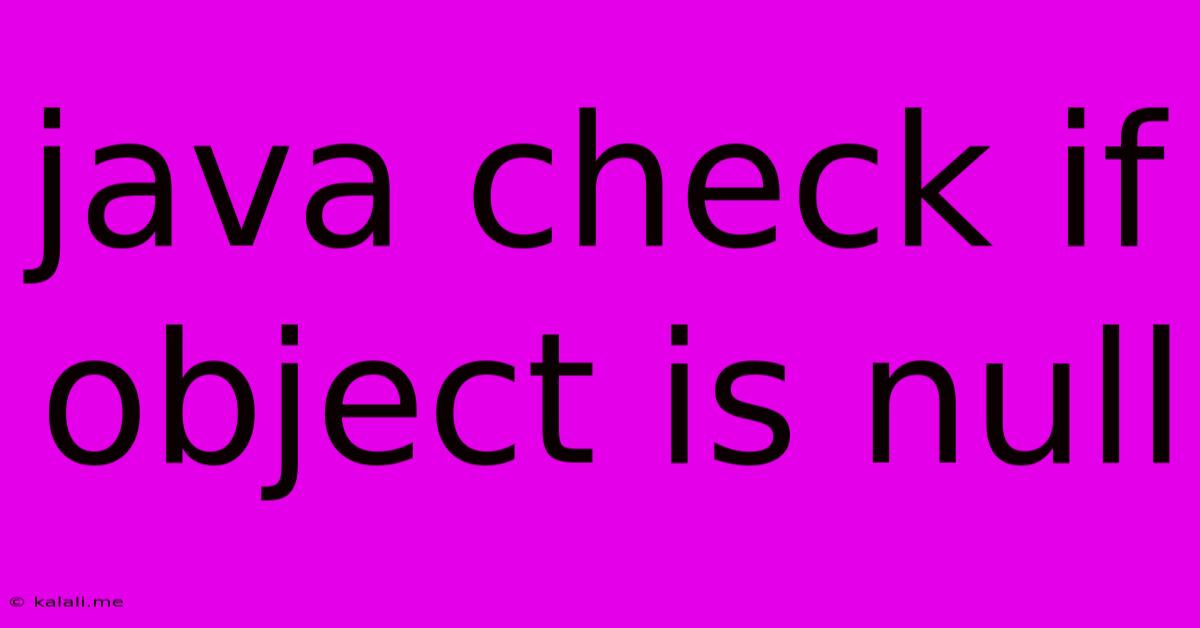Java Check If Object Is Null
Kalali
Jun 08, 2025 · 3 min read

Table of Contents
Java: Checking if an Object is Null – A Comprehensive Guide
This article provides a thorough guide on how to effectively check for null objects in Java, a crucial aspect of robust programming. Null pointer exceptions are a common source of errors, and understanding how to prevent them is essential for writing reliable Java applications. We'll explore various techniques, best practices, and common pitfalls to help you write cleaner, safer code.
Understanding NullPointerExceptions
A NullPointerException (NPE) occurs when you try to access a member (method or field) of an object that is currently referencing null. This means the variable doesn't point to any object in memory. Preventing NPEs is a key aspect of defensive programming, and properly checking for null objects is the first step.
Methods for Checking for Null Objects
Java offers several ways to check if an object is null. Here are the most common and effective approaches:
1. The == Operator
The simplest and most direct way is using the equality operator (==). This directly compares the object reference to null.
Object myObject = getObject(); // getObject() might return null
if (myObject == null) {
System.out.println("The object is null");
} else {
// Access members of myObject safely
System.out.println("The object is not null: " + myObject.toString());
}
This method is concise and efficient, making it the preferred approach for most null checks.
2. The Objects.isNull() method (Java 7 and above)
Introduced in Java 7, Objects.isNull() provides a more readable alternative to the == operator. It offers improved clarity, especially in complex conditional statements.
import java.util.Objects;
Object myObject = getObject();
if (Objects.isNull(myObject)) {
System.out.println("The object is null");
} else {
// Access members of myObject safely
System.out.println("The object is not null: " + myObject.toString());
}
While functionally equivalent to myObject == null, Objects.isNull() enhances code readability.
3. The Optional Class (Java 8 and above)**
For situations where null values are expected, the Optional class offers a more elegant solution. It encapsulates the possibility of a value being present or absent, eliminating the need for explicit null checks in many cases.
import java.util.Optional;
OptionalOptional promotes cleaner code by handling the absence of a value gracefully, reducing the risk of NPEs. It's especially useful when dealing with potentially missing data from external sources or databases.
Best Practices and Avoiding Pitfalls
- Check for null early and often: It's good practice to check for null immediately after receiving an object from a method or external source. This prevents propagation of nulls deeper into your code.
- Use meaningful variable names: Clear naming conventions help you understand the potential nullity of variables.
- Avoid nested null checks: Excessive nested
ifstatements to check for null values can make code hard to read and maintain. Consider refactoring using techniques like theOptionalclass or helper methods. - Handle null values gracefully: Instead of crashing with an NPE, gracefully handle null values by providing default values, returning early from a method, or logging an error message.
- Utilize static analysis tools: Tools like FindBugs or SonarQube can help identify potential null pointer exceptions in your code before runtime.
By employing these strategies and best practices, you can significantly reduce the occurrence of null pointer exceptions and improve the reliability and maintainability of your Java applications. Remember, consistent and thorough null checks are essential for building robust and error-free software.
Latest Posts
Latest Posts
-
Can You Use A Gun To Stop A Kidnapping
Jun 08, 2025
-
Gis Pro Move Labels On Topographic Map
Jun 08, 2025
-
Satan Masquerades As An Angel Of Light
Jun 08, 2025
-
Skyrim What Does Making A Skill Legendary Do
Jun 08, 2025
-
Replacing A Bathroom Exhaust Fan Motor
Jun 08, 2025
Related Post
Thank you for visiting our website which covers about Java Check If Object Is Null . We hope the information provided has been useful to you. Feel free to contact us if you have any questions or need further assistance. See you next time and don't miss to bookmark.